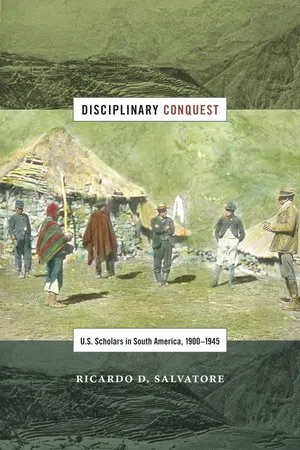
- English
- PDF
- Available on iOS & Android
Disciplinary Conquest : U.S. Scholars in South America, 1900–1945
About this book
In Disciplinary Conquest Ricardo D. Salvatore rewrites the origin story of Latin American studies by tracing the discipline's roots back to the first half of the twentieth century. Salvatore focuses on the work of five representative U.S. scholars of South America—historian Clarence Haring, geographer Isaiah Bowman, political scientist Leo Rowe, sociologist Edward Ross, and archaeologist Hiram Bingham—to show how Latin American studies was allied with U.S. business and foreign policy interests. Diplomats, policy makers, business investors, and the American public used the knowledge these and other scholars gathered to build an informal empire that fostered the growth of U.S. economic, technological, and cultural hegemony throughout the hemisphere. Tying the drive to know South America to the specialization and rise of Latin American studies, Salvatore shows how the disciplinary conquest of South America affirmed a new mode of American imperial engagement.
Frequently asked questions
- Essential is ideal for learners and professionals who enjoy exploring a wide range of subjects. Access the Essential Library with 800,000+ trusted titles and best-sellers across business, personal growth, and the humanities. Includes unlimited reading time and Standard Read Aloud voice.
- Complete: Perfect for advanced learners and researchers needing full, unrestricted access. Unlock 1.4M+ books across hundreds of subjects, including academic and specialized titles. The Complete Plan also includes advanced features like Premium Read Aloud and Research Assistant.
Please note we cannot support devices running on iOS 13 and Android 7 or earlier. Learn more about using the app.
Information
Table of contents
- Cover
- Contents
- Acknowledgments
- Introduction. Disciplinary Conquest
- One. South America as a Field of Inquiry
- Two. Five Traveling Scholars
- Three. Research Designs of Transnational Scope
- Four. Yale at Machu Picchu: Hiram Bingham, Peruvian Indigenistas, and Cultural Property
- Five. Hispanic American History at Harvard: Clarence H. Haring and Regional History for Imperial Visibility
- Six. Intellectual Cooperation: Leo S. Rowe, Democratic Government, and the Politics of Scholarly Brotherhood
- Seven. Geographic Conquest: Isaiah Bowman’s View of South America
- Eight. Worldly Sociology: Edward A. Ross and the Societies “South of Panama”
- Nine. U.S. Scholars and the Question of Empire
- Conclusion
- Notes
- References
- Index